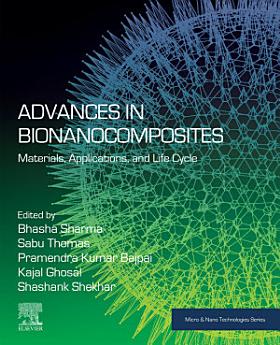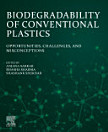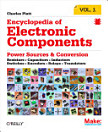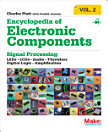Advances in Bionanocomposites: Materials, Applications, and Life Cycle
About this ebook
About the author
Dr. Bhasha Sharma is an Assistant Professor in the Department of Chemistry, Shivaji College, University of Delhi, India. She received her BSc (2011) in Polymer Sciences from the University of Delhi, and completed her Ph.D. in Chemistry in 2019. Her research interests revolve around sustainable polymers for packaging applications, environmentally benign approaches for biodegradation of plastic wastes, fabrication of bionanocomposites, and finding strategies to ameliorate the electrochemical activity of biopolymers.
Sabu Thomas is the chairman at the Trivandrum Engineering Science and Technology Research Park (TrEST Research Park) and the former vice chancellor at the Mahatma Gandhi University, Kottayam, Kerala, India. He is also the director at the School of Energy Materials, the School of Nanoscience and Nanotechnology, and the International and Inter University Centre for Nanoscience and Nanotechnology. Prof. Thomas is also the former director at the School of Chemical Sciences and the founder of the School of Polymer Science and Technology, Mahatma Gandhi University, Kottayam, Kerala, India. He received his Ph. D. in 1987 in Polymer Engineering from the Indian Institute of Technology (IIT), Kharagpur, India. He has been ranked no.1 in India about the number of publications (most productive scientists). Prof. Thomas’s research group specialized areas of polymers which includes Polymer blends, Fiber filled polymer composites, Particulate-filled polymer composites and their morphological characterization, Ageing and degradation, Pervaporation phenomena, sorption and diffusion, Interpenetrating polymer systems, Recyclability and reuse of waste plastics and rubbers, Elastomer cross-linking, Dual porous nanocomposite scaffolds for tissue engineering, etc. Prof. Thomas’s research group has extensive exchange programs with different industries, research, and academic institutions all over the world and is performing world-class collaborative research in various fields. Professors Centre is equipped with various sophisticated instruments and has established state-of-the-art experimental facilities which cater to the needs of researchers within the country and abroad. His H Index- 133, Google Citations- 86424, Number of Publications- 1300, and Books-160.
Dr. P.K. Bajpai is an Assistant Professor in the Department of Mechanical Engineering, Netaji Subhas University of Technology, New Delhi. His area of research includes processing of polymer composites, bio composites, machining aspects of composites, FEM modelling of composites, etc. He has published several research articles in various journals of repute and has contributed many book chapters in edited books of leading publishers. He has also worked as an editor for two edited volumes of books related to processing of polymer composites and two conference proceedings related to materials and manufacturing.
Dr. Kajal Ghosal is Visiting Researcher at the Slovak Academy of Science, Bratislava, Slovakia, and works as Associate Professor at Dr. B. C. Roy College of Pharmacy and AHS, Durgapur, India. She was selected among the international candidates for participating in the National Scholarship Programme of the Slovak Republic in 2019. Dr. Ghosal has obtained the D S Kothari Postdoctoral Fellowship from the University Grants Commission (UGC), Govt. of India, in 2013. She has 23 journal papers, 30 conference papers, 2 books, and 3 book chapters.
Shashank ShekharAssistant Professor, Department of Chemistry, Netaji Subhas University of Technology, Delhi, India Dr. Shashank Shekhar is currently an Assistant Professor at Netaji Subhas University of Technology and is also associated with the Quantum Research Centre of Excellence as Associate Director in the Department of Renewable Energy. He completed his PhD in Chemistry at the University of Delhi. Dr. Shekhar has been working on biopolymers and Schiff base metal complexes for the last 5 years and has published articles in reputed international journals.







